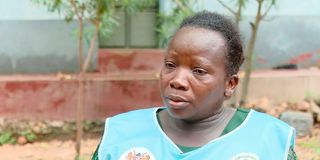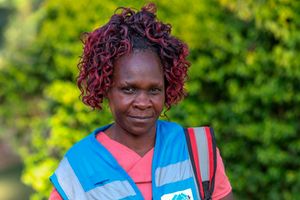A day in life of a CHP, the lifeblood of Kenya’s healthcare system

Mary Kinyua, a Community Health Promoter in Tharaka Nithi County, during an interview on March 26, 2025 in Chiakariga Ward.
What you need to know:
- Mary braves harsh conditions—muddy terrain, heavy rains, and security risks—to serve her community.
- Her work is driven by passion, not just stipends, as she follows up on patients, encourages medication adherence, and provides emergency referrals.
Nestled in the heart of Kenya, Tharaka Nithi County is a land of striking contrasts and breathtaking beauty. The fertile soils enriched by seasonal rains burst with an abundance of crops as we set foot in Karimamoro village, Magumoni Ward.
Mary Kinyua graciously welcomes us into her home, which is shaded by towering trees. It is 7am and the morning air is crisp with the scent of damp earth and distant wood smoke.
Mary reviews her checklist one last time, ensuring everything is in place for a successful outreach.
She is among the 1,267 community health promoters in Tharaka Nithi County and among the 10 stationed within Kangoro unit in Magumoni.

Pelina Kaithi, a Community Health Promoter, during the interview.
These unsung heroes bridge the gap between healthcare facilities and marginalised communities, offering critical services—from monitoring chronic illnesses like hypertension and diabetes to supporting maternal and child health.
Mary braves harsh conditions—muddy terrain, heavy rains, and security risks—to serve her community. Her work is driven by passion, not just stipends, as she follows up on patients, encourages medication adherence, and provides emergency referrals.
Familiar face
On this particular day, the Healthy Nation team accompanies her as she visits different households, where she is both a familiar face and a trusted advisor.
In one homestead, she is welcomed with open arms by a middle-aged couple. The man of the house is hypertesive but has been reluctant to take his medication.
Mary immediately swings into action, swiftly unpacking her blood pressure monitor. She straps it onto the man’s arm and watches as the numbers climb past the safe threshold.
Mary notes that men, especially in rural and low-income communities, often avoid medical check-ups until their conditions become emergencies.
“I advise them to always prioritise their health. Some often prioritise immediate needs (like work or family expenses) over preventive care.”
Mary’s fingers fly across her smartphone screen as she logs blood pressure readings. Gone are the days of paper registers that got lost in the rain or smudged beyond recognition. Today, every piece of data she collects is securely stored, analysed, and used to save lives—all through her government-issued mobile phone.
“These phones have helped us so much; we key in data on the electronic community health information systems and we are not scared of losing it. When we were using notebooks, we would end up losing the data as the books would get lost.”
Tharaka Nithi Governor and the Council of Governor’s Health Committee Chairperson Muhtomi Njuki says there is a need for an enhanced digital health system to scale up community health promoters across the country. He notes that his county is set to launch a geographic information system, the first of its kind in Kenya, that will help map out healthcare data and ailments across the devolved unit.
In Karimamoro, villagers share how community health promoters came and changed everything.
Fridah Gacheri’s voice cracks as she remembers the dark days before the CHPs arrived in the village. “We used to suffer in silence. We buried people who didn’t have to die,” she says. “A fever, a cough, a mother bleeding after birth—things that could be fixed if we had just known what to do or had money for the hospital.”
Today, when sickness strikes, Fridah doesn’t panic. She picks up her phone and calls Mary. “Before the sun sets, she’s at my door with her kit. No money needed.”
A few kilometres away, we make our way to Chiakariga ward, where 43-year-old Pelina Kaithi starts her day with purpose. She has been a CPH for 16 years. To the people of Chaikariga, she is more than a CHP. She is a guide, a friend and a voice of hope in their everyday struggles.
“I love my job, and when I see someone benefit from my work, it brings me joy,” says Pelina.
As she navigates the narrow paths that weave through the village, she greets familiar faces with a warm smile as leads us to her first homestead. She is here to check up on Winjow Muthoni, a new mother.
“We call her our doctor. When she gets wind that you are unwell, she makes it her priority to check up on you. She monitors my pressure and makes sure my newborn is breastfeeding well. If you are unwell, she refers you to hospital and if you do not have money, she also helps you with bus fare,” says Winjow.
Many of the locals reach out to Pelina as a first line of response in a medical situation, and this has made her gain trust within the community.
Despite Pelina’s passion for her job, she encounters some challenges.
“I walk for many kilometers from one house to another under the scorching sun. I do not have security and there are instances I am called for emergency cases at night.”
In Kibra, Nairobi County, Francis Odera, another CPH, notes that despite their dedication to the craft, they are constantly exposed to infectious diseases as they visit households. He notes that they are only armed with gloves.
“During Covid-19, many CPHs were exposed because we did not have protective gear. During a cholera outbreak, we also end up exposed.”
The CPHs have also cited delayed payments. Most counties pay CHPs a stipend of 3,500 plus a top-up from the national government.
“We expect to receive our stipend every month, but it is often delayed for up to six months,” says Mary.
In September 2023, President William Ruto launched an initiative to deploy 100,000 community health promoters across all 47 counties. But the Council of Governors insists that the actual number of CHPs in Kenya is 107,800, meaning 7,800 CHPs are not accounted for.
“I don’t want to say it was wrong for Kenya Kwanza to introduce CHPs, the issue is that when they weighed into the programme, there was a problem. We are not synergiSed in the way we deliver services. As counties, we want to have one kitty so that we can be able to have one pay point, but that has not happened,” says Mr Njuki.
As key contributors to driving universal health coverage, CPHs are now calling upon the national and county governments to improve their working conditions, including increased stipends, enhanced training, and improved welfare packages.




